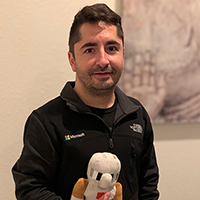 The new undergraduate degree program, Integrated Business and Engineering (IBE), has enrolled its first cohort of students to begin in the fall 2021 semester. Existing students in the BSIM program will continue to be supported until the last class, which started in 2020, has graduated. (Stock photo)
The new undergraduate degree program, Integrated Business and Engineering (IBE), has enrolled its first cohort of students to begin in the fall 2021 semester. Existing students in the BSIM program will continue to be supported until the last class, which started in 2020, has graduated. (Stock photo)
Reimagining Industrial Management
Krannert introduces Integrated Business and Engineering degree
When Krannert’s Bachelor of Science in Industrial Management (BSIM) program graduated its first class of 80 students in 1961, approximately 95 percent were transfers from Purdue’s College of Engineering.
That STEM tradition strengthened over the years as the BSIM program attracted students who excelled in rigorous science, technology, engineering and math courses, all while building a strong management core.
As the school’s first undergraduate degree program, BSIM also has a storied base of alumni.
“The Industrial Management degree has generated some of our most successful students,” says David Hummels, the Dr. Samuel R. Allen Dean of the Krannert School. “Graduates consistently had the best starting salaries and many went on to found their own businesses or lead major companies.”
Now, the Industrial Management program has undergone an important reimagining to better prepare students for leadership roles in a rapidly evolving business world. This careful pivot came with guidance from alumni, corporate partners, students, and faculty, and with design and curricular input from the College of Engineering.
The new undergraduate degree program, Integrated Business and Engineering (IBE), has enrolled its first cohort of students to begin in the fall 2021 semester. Existing students in the BSIM program will continue to be supported until the last class, which started in 2020, has graduated.
Given its history of excellence and impressive alumni base, some might ask why the BSIM program is being reimagined. While declining enrollment was one consideration, Hummels says the program was primarily experiencing an identity crisis.
“The main thing is that we thought Industrial Management doesn't really describe what the degree does for students or what it enables them to do when they finish,” Hummels says. “We wanted to take the best elements of the BSIM degree and use them as a foundation to create something more aligned to the needs of students and recruiters.”
Now, through a partnership between the Krannert School of Management and the College of Engineering, every year an elite group of students will enter the IBE program. Students will graduate with a business degree and an engineering background that will set them apart from other students.
“The world needs problem solvers who can turn technological advances into economic and social benefits — people who can make sound, data-directive decisions that have broad and lasting effect,” Hummels says. “In the integrated business and engineering degree program, students take core courses in both areas and then take special labs focused on solving problems.
“This might mean designing new products or new services or it might mean taking technologies emerging from the amazing labs that we have here at Purdue and finding ways to commercialize them to solve important market needs.”
At the core
IBE students will primarily take engineering courses in their first year, followed by a solid foundation of business courses in their sophomore year. From there, they will choose from a menu of electives. For example, the Imagine, Model and Make course teaches students how to design and optimize new prototypes in 3D; and students in the Predictive Analytics course work on projects ranging from sports-lineup optimizations to improving energy efficiency.
Beginning as early as their first year, IBE students will also have the opportunity to take part in the College of Engineering’s Vertically Integrated Projects (VIP) program. In VIP, undergraduate students from a variety of disciplines and backgrounds work together on teams with faculty and graduate student mentors on authentic projects that can last several years or even decades.
During their senior year, they will work on an interdisciplinary, team-based capstone project sponsored by a company that advises and recruits IBE students. “All of these projects exist at the intersection of business and technology,” Hummels says. “That's why we really think this degree and this experience is going to be so important for students.”
All IBE students will also be offered admission to the Larsen Leaders Academy, which gives high-achieving business students enhanced academic and professional learning opportunities and experiences. In addition, students can complete exclusive internships or study abroad while taking online courses through the Krannert Summer Business Academy.
Similar to the BSIM program, IBE graduates can expect to find high-paying jobs as consultants or analysts in a wide variety of high-tech companies, from financial services and healthcare to manufacturing and beyond.
“Armed with a Krannert education and Purdue’s premier reputation in science, engineering and technology, graduates will be ready to adapt and lead in changing environments, spur creativity and make key strategic decisions,” Hummels says.
Alumni endorsement
The change to the IBE program was made with the support of alumni who believe it will take the best elements of the BSIM degree to create a new program that is better aligned to the needs of students and employers.
Among those expecting continued success is Dean’s Advisory Council (DAC) member Tim Coleman (BSIM ’90), vice president and information officer, Medicines Development Information and Digital Solutions, at Eli Lilly and Company.
“I am thankful to have benefitted from the BSIM experience,” Coleman says. “It was valuable preparation for continuing my education in a top graduate MBA program and entering my career ready to solve complex business problems with grit and resilience. The combination of strong analytical rigor with an excellent business education prepared me well for the growing leadership opportunities and challenges that I have faced at each level of my career.”
Coleman believes the move to the IBE program represents a shifting business landscape that demands constant change.
“It is in the best interest of Purdue, employers and students to ensure that Krannert's undergraduate programs continue to pace and be relevant with advances in business, technology and analytics,” he says.
Another DAC member, Maria Crowe (BSIM ’82), credits the Industrial Management program for her long career at Lilly, where she worked since graduation. Leading a network of 22 sites in 13 countries, she retired in 2017 as president of Manufacturing Operations.
“Everything I learned through the BSIM program at Krannert applied to my various roles at Eli Lilly, from IT and procurement to supply chain and manufacturing,” Crowe says. “The degree gave me a bedrock of skills that helped me advance and achieve at every step.”
Crowe is energized to see the degree reimagined through the IBE program, which will intersect STEM fields and business. “It will be a unique degree that only Purdue is positioned to offer,” she says.
The alumni agree that prospective employers will find IBE graduates attractive.
“We want to see the same high learning agility, leadership potential, grit and resilience in Krannert undergraduates moving forward to help our companies address modern business and engineering challenges and new business possibilities globally,” Coleman says.









